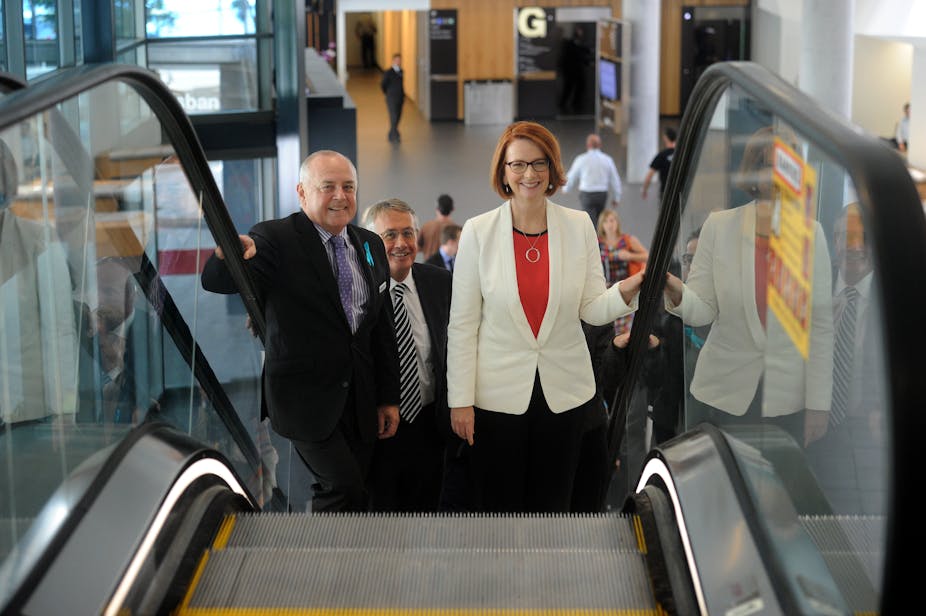Prime Minister Julia Gillard has been encouraged to be more open and accountable to the Australian public by releasing her official meeting diary.
Although Gillard is not legally required to, Freedom of Information Commissioner, Professor John McMillan, claims the diary’s release is “implicitly encouraged by the FoI Act.”
“There is undeniably a strong public interest in knowing what ministers are doing officially and who they are addressing,” Professor McMillan said.
McMillan was responding to a denied FoI request by Fairfax Media for access to a month of the Prime Minister’s diaries.
While Ms Gillard already publishes a public schedule, McMillan suggests the federal government should go much further.
And he is 110% correct - the public should be made fully aware of who is having ‘face time’ with our nation’s leader.
In the ‘Guide to the Freedom of Information Act 1982’ it clearly states that “government information is a national resource and as such, should be available for public access and use.”
If we are to look at and use that definition of information as our base, then the Prime Ministers meeting diary is a national resource and the information in it is highly important to the voting public. Especially in a world that is becoming increasingly critical of government processes.
After all Ms Gillard and her Ministers meet with many people who want to influence the government and the decisions it makes.
In the United Kingdom, Prime Minister David Cameron releases his Ministers diaries to the public and a similar process occurs in the United States with President Barack Obama.
Both political leaders put it all on the public record. Nothing is hidden.
Soon Queensland, a state that has led the way on freedom of information, will see Premier Campbell Newman and his ministers diaries released publicly.
This will see edited versions uploaded on the Queensland government website and updated once a month.
It is a positive move and highlights Queensland’s positive attitude toward FoI.
When it comes to information release, the sunshine state has always had a “push model” whereby government information is “pushed” out, rather than the public having to “pull” it out.
The push model allows the government to select important and sensitive information, then make the rest available as simply and quickly as possible, with or without a formal request.
It was a corner stone idea copied for the federal FoI reforms and aims to promote confidence in our elected representatives.
Following the 2010 election, Ms Gillard claimed she would lead an open and transparent government - publically releasing the diaries offers her the chance to cement that commitment.
“What the Australian people told us, and they told us this in no uncertain terms on that day and on the days that have followed, is this: that we will be held more accountable than ever before, and more than any government in modern memory,” Ms Gillard said after being handed the Prime Minister-ship in September 2010.
“We will be held to higher standards of transparency and reform, and it’s in that spirit that I approach the task of forming a government … So, let’s draw back the curtains and let the sun shine in; let our parliament be more open than it ever was before.”
The release of the diaries will not only fulfil this commitment but will also promote that pro-disclosure culture when it comes to federal government information.
It all harks back to that important “push model” ideal. An ideal that saves time for both government and public alike.
Professor McMillan’s call for the diary release was spurred on by an FoI request made by Fairfax Media in 2010 for for one month of the Prime Minister’s diaries
The request was denied on the grounds it would involve too much work for her office.
Fairfax Media’s request asked for all personal entries and meetings with constituents to be excluded because the FoI Act only covers information relating to activities as a minister.
“Ms Gillard’s office responded that the request covered 40 pages and included about 500 entries, which had to be assessed. It estimated that it would take about 163 hours or more than four weeks to process. The commissioner agreed this was too time consuming.”
But if this information was made publicly available it would free up the timely and often costly process of requesting this information through FoI.
Everyone wins.
In an election year that is increasingly becoming all about trust, perhaps this is one way the Gillard Government can increase voter trust.
To spruik the terms “open; accountable and transparent” is one thing, to act on them is another.
But the public release of the diaries would be a step toward acting on those terms.

